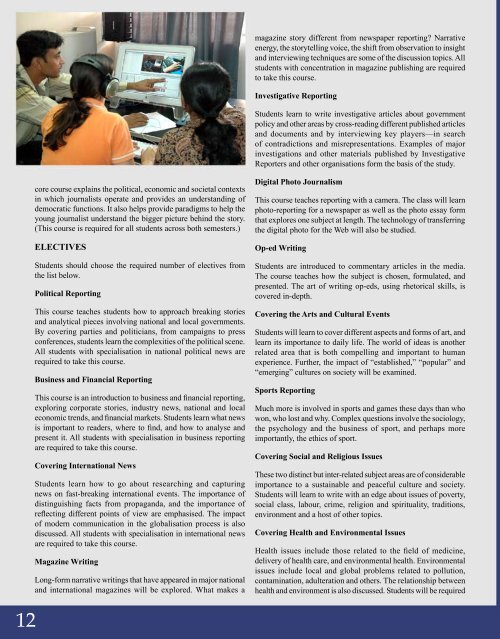IIJNM Prospectus - Indian Institute of Journalism & New Media
IIJNM Prospectus - Indian Institute of Journalism & New Media
IIJNM Prospectus - Indian Institute of Journalism & New Media
Create successful ePaper yourself
Turn your PDF publications into a flip-book with our unique Google optimized e-Paper software.
12<br />
core course explains the political, economic and societal contexts<br />
in which journalists operate and provides an understanding <strong>of</strong><br />
democratic functions. It also helps provide paradigms to help the<br />
young journalist understand the bigger picture behind the story.<br />
(This course is required for all students across both semesters.)<br />
ELECTIVES<br />
Students should choose the required number <strong>of</strong> electives from<br />
the list below.<br />
Political Reporting<br />
This course teaches students how to approach breaking stories<br />
and analytical pieces involving national and local governments.<br />
By covering parties and politicians, from campaigns to press<br />
conferences, students learn the complexities <strong>of</strong> the political scene.<br />
All students with specialisation in national political news are<br />
required to take this course.<br />
Business and Financial Reporting<br />
This course is an introduction to business and financial reporting,<br />
exploring corporate stories, industry news, national and local<br />
economic trends, and financial markets. Students learn what news<br />
is important to readers, where to find, and how to analyse and<br />
present it. All students with specialisation in business reporting<br />
are required to take this course.<br />
Covering International <strong>New</strong>s<br />
Students learn how to go about researching and capturing<br />
news on fast-breaking international events. The importance <strong>of</strong><br />
distinguishing facts from propaganda, and the importance <strong>of</strong><br />
reflecting different points <strong>of</strong> view are emphasised. The impact<br />
<strong>of</strong> modern communication in the globalisation process is also<br />
discussed. All students with specialisation in international news<br />
are required to take this course.<br />
Magazine Writing<br />
Long-form narrative writings that have appeared in major national<br />
and international magazines will be explored. What makes a<br />
magazine story different from newspaper reporting? Narrative<br />
energy, the storytelling voice, the shift from observation to insight<br />
and interviewing techniques are some <strong>of</strong> the discussion topics. All<br />
students with concentration in magazine publishing are required<br />
to take this course.<br />
Investigative Reporting<br />
Students learn to write investigative articles about government<br />
policy and other areas by cross-reading different published articles<br />
and documents and by interviewing key players—in search<br />
<strong>of</strong> contradictions and misrepresentations. Examples <strong>of</strong> major<br />
investigations and other materials published by Investigative<br />
Reporters and other organisations form the basis <strong>of</strong> the study.<br />
Digital Photo <strong>Journalism</strong><br />
This course teaches reporting with a camera. The class will learn<br />
photo-reporting for a newspaper as well as the photo essay form<br />
that explores one subject at length. The technology <strong>of</strong> transferring<br />
the digital photo for the Web will also be studied.<br />
Op-ed Writing<br />
Students are introduced to commentary articles in the media.<br />
The course teaches how the subject is chosen, formulated, and<br />
presented. The art <strong>of</strong> writing op-eds, using rhetorical skills, is<br />
covered in-depth.<br />
Covering the Arts and Cultural Events<br />
Students will learn to cover different aspects and forms <strong>of</strong> art, and<br />
learn its importance to daily life. The world <strong>of</strong> ideas is another<br />
related area that is both compelling and important to human<br />
experience. Further, the impact <strong>of</strong> “established,” “popular” and<br />
“emerging” cultures on society will be examined.<br />
Sports Reporting<br />
Much more is involved in sports and games these days than who<br />
won, who lost and why. Complex questions involve the sociology,<br />
the psychology and the business <strong>of</strong> sport, and perhaps more<br />
importantly, the ethics <strong>of</strong> sport.<br />
Covering Social and Religious Issues<br />
These two distinct but inter-related subject areas are <strong>of</strong> considerable<br />
importance to a sustainable and peaceful culture and society.<br />
Students will learn to write with an edge about issues <strong>of</strong> poverty,<br />
social class, labour, crime, religion and spirituality, traditions,<br />
environment and a host <strong>of</strong> other topics.<br />
Covering Health and Environmental Issues<br />
Health issues include those related to the field <strong>of</strong> medicine,<br />
delivery <strong>of</strong> health care, and environmental health. Environmental<br />
issues include local and global problems related to pollution,<br />
contamination, adulteration and others. The relationship between<br />
health and environment is also discussed. Students will be required


